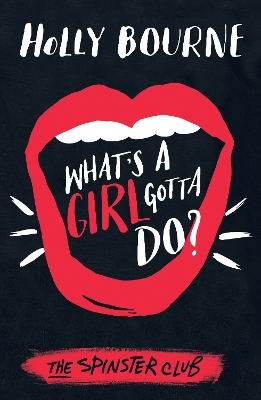
Jo
Written on Aug 25, 2016
Originally posted on Once Upon a Bookcase.
It's no secret that I love Holly Bourne's The Spinster Club Trilogy, and I have been so excited to read the third and final book, What's a Girl Gotta Do? Being Lottie's story, the member of the Spinster Club with the most knowledge of feminist ideas, I was sure this was going to be incredible. But it's not incredible. No, it surpasses incredible. It's bloody epic!
When Lottie has a terrible day - sexually harassed by two men on her way to school, has a guy in her Philosophy study group take a point she made and pass it off as his own, and discovers a girl in FemSoc may have been sexually assaulted by her ex boyfriend - she decides she's had enough. Enough with sexism. With the help of Amber and Evie, the rest of FemSoc, and Will, a guy in Evie's Film Studies class who's pretty nifty with a camera, Lottie decides to start the #Vagilante campaign, where she will call out every instance of sexism she sees, no matter how big or small for a whole month. No billboard, pharmacy or person is safe. Will videos everything and uploads it all to a vlog, and the views keep mounting. When Will arranges for Lottie to be interviewed for the local newspaper, her story gets picked up by major news corporations, and everyone wants a piece of her. But all the attention she's getting has brought out the trolls. Will Lottie be able to continue with her campaign, or will she buckle under the pressure?
Oh my god, I cannot even begin to tell you how amazing this book is! What's a Girl Gotta Do? takes everything that's been discussed in the previous books, and actually puts it into action. Lottie is so incredibly passionate about fighting sexism, and her fire and strength is a wonder to behold. She believes that to really tackle sexism, you also have to fight against the small instances as well as the big ones. She talks about the idea that the more serious acts of sexism - like sexual assault and domestic violence - are held up by the smaller ones - the sexist advertisements, the pink box of of pills for period pain, which is bog-standard ibuprofen but more expensive, how women must state their marital status by their title; "Miss" or "Mrs". If you don't fight against the smaller acts of sexism, if you let them go, how can you hope to truly remove the sexist ideas that lead to abuse against women? It all has to go.
This on it's own is, of course, brilliant, but it's seeing how big Lottie's campaign gets that I really loved. When people who are campaigning against something go viral, they draw the attention of the media, and things snowball. Suddenly their campaign is reaching more people - those who agree, those who have had their eyes opened, and those who want to do all they can to shut you up. Lottie's little personal project becomes something so much bigger once people start taking notice, and it's wonderful to see how she deals with it all. The struggles she faces, the self-doubt, the exhaustion. You feel for Lottie, but you're also made aware of what all those campaigners you see in the news have to deal with. You root for Lottie, and as you do so, you root for every other person out there campaigning against sexism.
There was one thing - a small, tiny thing - that disappointed me about What's a Girl Gotta Do? Lottie's mum is a bit of a hippy, and when Will comes to Lottie's house, she cleanses his aura, and they joke about it:
'"I'm not sure what good it will do you," I said. "Some auras just can't get clean..."
He laughed at that - a short burst of it, like he hadn't meant it. "I have an incurable aura?"
I giggled too. "A herpes aura."
"That's disgusting."
"You're telling me."' (p168)*
No-one wants herpes or any kind of STI, but some people have them, and they have to live with them. Some, like herpes, are incurable. We seriously need to stop shaming people people for the diseases/infections they have. They're still people. They're not disgusting. STI+ people shouldn't have to be on the receiving end of jokes and judgement over something that is really not anyone's business (unless you're a sexual partner), which is exactly what, in this example, someone with herpes will find when reading What's a Girl Gotta Do? It is a small thing in the great scheme of the whole of the book, but in a book that's about fighting against the prejudice and discrimination a group of people face, my heart sank to see another group of people being discriminated against.
But back to the awesomeness of this book. As someone who reads feminist non-fiction, not all of the ideas brought up in What's a Girl Gotta Do? or the other books in the series are new to me. But Bourne introduces these ideas to teenagers, new or soon-to-be feminist who haven't read feminist non-fic, and breaks them down and explains them in such a way that there's no confusion. This doesn't mean she dumbs things down for her teenage audience, but explains things more simply than the dense non-fic does. She's even flicked a switch for me a couple of times, where I finally understand ideas I've read about before.
I honestly believe that The Spinster Club Trilogy are real game changers; where other YA novels have tackled feminist topics, The Spinster Club books talk about feminism itself, what it is, and why we need it. Where the other books enrage readers, The Spinster Club Trilogy shows readers exactly what they can do with that rage to enact change.
This is a powerful and incredibly inspiring finale to the trilogy that will spark many a flame in it's readers, making them want to get out and fight the patriarchy too! There was an incredible and stirring author's note at the end of the book from Bourne that is pretty much a call to action; it was so impassioned it really got to me, and actually brought tears to my eyes. I'm so sad that this is the end of the Spinster Club. I just want more! So I am so, so, so excited to read the novella being published in November, ...And a Happy New Year? But what I'm going to do after that book, I don't know. I guess I'll have to start my own Spinster Club.
*I have a proof, but I checked this quote and page number in a finished copy.
Thank you to Usborne for the proof.
